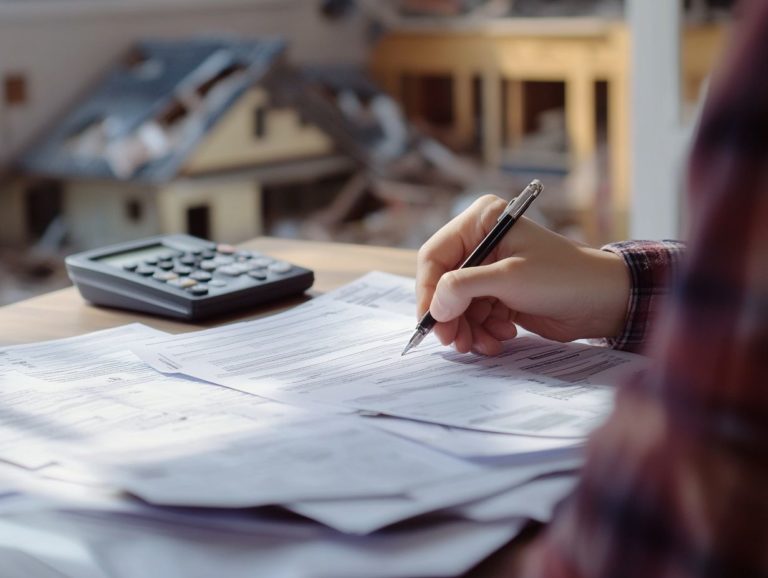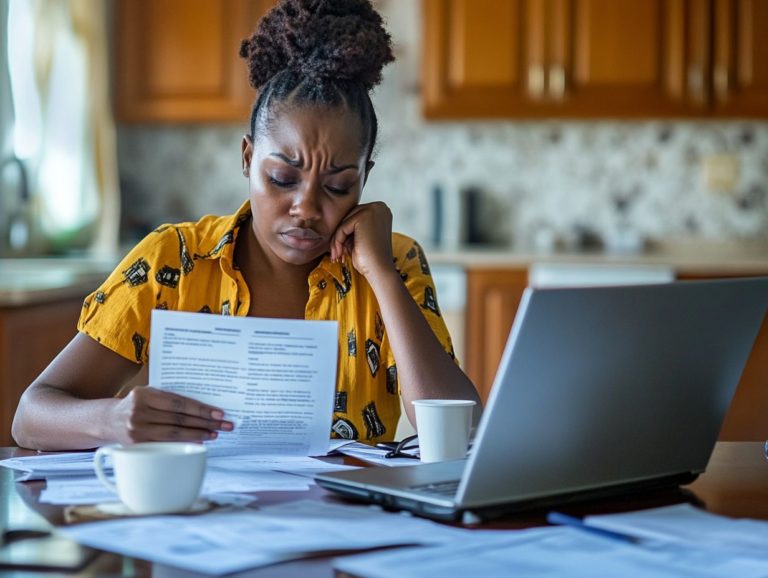What You Should Know About Liability Claims
Liability claims can catch you off guard, leaving you in a maze of confusion regarding your rights and responsibilities. It’s essential to grasp the different types be they personal, professional, or product-related if you want to shield yourself effectively.
This article delves into the common causes of liability claims, ranging from everyday mishaps to more intricate situations. It lays out immediate steps to take if you find yourself involved in a claim, highlights factors that could influence its outcome, and presents strategies to reduce your risk.
It also guides you through the legal landscape, including how to collaborate with insurance and legal professionals. Get ready with the knowledge you need to navigate and protect against liability claims with confidence.
Contents
Key Takeaways:
- Liability claims can arise from various situations and can have serious consequences for individuals and businesses.
- Act now to protect yourself: Taking immediate action and documenting the incident can help.
- Preventive measures and risk management strategies can help mitigate the risk of liability claims and protect against potential financial losses.
Understanding Liability Claims
Grasping intricacies of liability claims is crucial for both individuals and business owners, as these claims can emerge from various situations involving personal or commercial liability or a failure to take proper care. The potential for financial loss and legal consequences cannot be underestimated.
Liability claims cover a spectrum of circumstances, from those filed for property damage and bodily injury to the complex insurance contracts that outline coverage limits and processes for seeking compensation for damages.
It s vital for you to understand the fundamentals of liability insurance. This knowledge will empower you to navigate the complexities of legal responsibilities with confidence and protect your personal assets effectively.
Definition and Types of Liability Claims
Liability claims encompass various categories, including:
- Personal liability insurance: which covers injuries you cause to others.
- Commercial general liability insurance: which protects businesses from lawsuits related to bodily injury and property damage.
- Product liability insurance: essential for manufacturers, tackling claims from consumers harmed by faulty products.
- Errors and omissions insurance: crucial for professionals like consultants and brokers, offering protection against claims of negligence or subpar work.
These claims serve as a vital shield, protecting you whether an individual or a business from the financial fallout that can arise from legal disputes stemming from your actions or negligence. For example, personal liability insurance covers injuries or damages inflicted on third parties, offering you peace of mind as a homeowner or tenant.
On the other hand, commercial general liability insurance acts as a fortress for businesses, guarding against lawsuits related to bodily injury and property damage that may occur on their premises.
If you re a manufacturer, product liability insurance is essential, tackling claims from consumers harmed by faulty products.
For professionals like consultants and brokers, errors and omissions insurance is crucial, as it offers protection against claims of negligence or subpar work.
Each type of insurance not only delivers essential coverage but also enhances your credibility and trustworthiness in the eyes of clients and customers.
Common Causes of Liability Claims
Common causes of liability claims typically center on negligence, a serious matter that can lead to bodily injury or property damage.
When this occurs, third parties may pursue claims seeking compensation for losses they ve incurred due to another party s failure to uphold their legal duties. Understanding this can help you navigate potential risks in your dealings.
Examples and Scenarios
Liability claims can emerge in a variety of circumstances, such as when someone slips and falls on a business’s property, potentially leading to commercial liability, or when negligence triggers substantial compensation claims that can impact personal assets.
Imagine this: you visit your local grocery store, only to find yourself slipping on a wet floor without a warning sign in sight. This seemingly minor oversight could not only result in an injury but also pave the way for a serious liability claim against the store.
If you, the injured party, decide to seek compensation for medical expenses and lost wages, the grocery store s liability insurance might step in to cover those costs. However, this could also have a significant effect on the store s financial health.
In a similar vein, consider automotive accidents. A driver who neglects to yield might find themselves facing civil suits for vehicle damages and personal injury. This illustrates how negligence in everyday actions can lead to legal consequences that impact both individuals and businesses alike.
Steps to Take in the Event of a Liability Claim
If you face a liability claim, knowing what to do is critical. Proper documentation can greatly influence the outcome.
This understanding empowers you to navigate potential legal costs and your insurance policy with confidence.
Immediate Actions and Documentation
Right after an incident, gather detailed documentation. This helps ensure your claims align with your insurance coverage.
Start by noting down the time, location, and any parties involved. Take photographs, as they provide strong visual evidence.
Don’t forget witness statements. They can help verify what happened, supporting your case effectively.
By keeping clear records, you boost your claim’s credibility and pave the way for a smoother resolution.
Factors Affecting Liability Claims
Several factors can profoundly influence liability claims in your case.
These include the degree of negligence involved, the coverage limits in your insurance policy, and how shared fault may impact the validity of the claim.
Shared fault can significantly influence the outcome of liability claims. It evaluates how much your actions contributed to the incident.
This assessment impacts both liability limits and your overall responsibilities throughout the claims process.
This concept also looks at how your actions connect with those of others involved. By examining each party’s negligence, the legal system aims to fairly allocate blame, affecting any compensatory damages awarded to you.
When evaluating shared fault, consider factors such as the specifics of the incident and your awareness of potential risks. The implications are considerable; if you’re found partially at fault, it could reduce the amount you can recover.
This may influence both your strategy and the outcomes you achieve in the claims process.
How to Protect Yourself from Liability Claims
It’s essential to protect yourself from liability claims! You can achieve this through effective risk management strategies.
Securing comprehensive liability insurance and implementing preventive measures tailored to your specific risks will significantly enhance your protection.
By taking these proactive steps, you ll be better equipped to handle unforeseen challenges.
Preventive Measures and Risk Management Plans
Implementing strong risk management plans is essential, especially if you re a high-net-worth individual. This approach helps mitigate potential liability claims and ensures adequate insurance coverage.
Conduct comprehensive risk assessments regularly. This practice identifies vulnerable areas in your lifestyle or investments and empowers you to take action.
For high-net-worth individuals, collaborating with financial advisors or legal professionals specializing in risk management can provide tailored advice to maximize asset protection.
Maintaining a solid liability insurance policy, supplemented by umbrella insurance, adds an extra layer of security you won’t want to overlook.
Equally important is educating your family members and employees about these practices. Creating a culture of awareness and prevention across all aspects of your life and business is vital.
Taking proactive steps like these will significantly reduce your exposure to potential claims and help safeguard your future!
Going through the legal process of a liability claim can be quite complex for you as a policyholder. It requires a clear understanding of the claims process, effective communication with your insurance company, and possibly the assistance of insurance experts to help you maneuver through the legal intricacies.
Working with Insurance and Legal Professionals
Collaborating with insurance and legal professionals can greatly simplify the often daunting task of navigating the claims process. This partnership ensures that you are well-informed about your options and any potential legal costs associated with your liability claims.
Their expertise makes complex policy terms clear. This helps you present your claims effectively. In these intricate situations, having seasoned advocates by your side can significantly reduce delays and enhance your chances of achieving a favorable outcome.
These professionals can pinpoint the critical evidence required to support your claim and guide you through the necessary procedures. Their insights can highlight potential pitfalls that may arise during the claims process, ultimately offering you peace of mind and a clearer path forward.
Watch this video to understand liability claims better!
Frequently Asked Questions
What is a liability claim?
A liability claim is a legal demand for compensation or damages made by someone who has suffered an injury or loss due to the actions or negligence of another person or entity.
What types of situations can result in a liability claim?
Liability claims can arise from various situations such as car accidents, slip and falls, product defects, medical malpractice, and more. Essentially, any situation where someone suffers harm or loss due to someone else’s actions can result in a liability claim.
Who can file a liability claim?
Anyone who has suffered an injury or loss due to someone else’s actions or negligence can file a liability claim. This includes individuals, businesses, and even government entities.
What should I do if I am involved in a liability claim?
The first thing you should do is seek medical attention for any injuries you may have sustained. Then, gather as much evidence as possible, such as photos, witness statements, and medical records. Finally, contact a personal injury lawyer to help you navigate the legal process.
What is the statute of limitations for filing a liability claim?
The statute of limitations for liability claims varies by state and type of claim. In general, it is important to file a claim as soon as possible after the incident to ensure that you do not miss any deadlines for filing. A personal injury lawyer can help you determine the specific statute of limitations for your case.
How long does it take to resolve a liability claim?
The length of time it takes to resolve a liability claim can vary greatly depending on the specifics of the case. Factors such as the severity of the injuries, the amount of evidence needed, and the willingness of the opposing party to negotiate can all impact the timeline. Talk to your personal injury lawyer as soon as possible to understand how quickly you can move forward!




